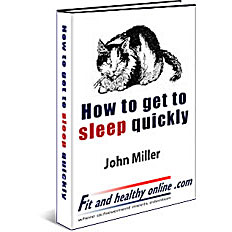Why not teach yourself to get to sleep quickly
An inability to sleep well is just one of the many symptoms of metabolic and/or psychological dysfunction.
Poor sleep is definitely not caused by a lack of Stilnox! That’s why the doctor and the chemist would be the last places you’d go, not the first, in your quest for a good night’s sleep.
The advice of the drug industry will not help to answer the question, ‘Why am I not sleeping as well as I’d like to and what can I do about it?’ On the contrary, what you’ll get is a ‘preventive health’ prescription for a drug. The drug will certainly help you go to sleep but it will prevent you from addressing the reasons why you’re not sleeping well.
Healthy people sleep like kittens. If you’re not sleeping well, relying solely on a drug to get to sleep is not going to make you healthier. It’s preventing you from becoming healthier – hence the term ‘preventive heath’.
Only in the rarest of cases is poor sleep a medical or pharmaceutical problem.
If you’re focussed on getting a good night’s sleep, first work out how much sleep you really need.
Napoleon Bonaparte is reported to have said, ‘six hours for a man, seven for a woman and eight for a fool’. Some people exist quite happily on a lot less than six hours.
What this means is that you need to decide how many hours sleep you need to function in the peak performance zone.
Some time ago a man in one of my seminars said he didn’t sleep well. I asked him what the problem was. He said he kept waking up at 4.30am. I said ‘What time do you go to bed?’ He said ‘9.30pm.’ I said ‘That’s seven and a half hours. Get up – or go to bed later.’ If he’d gone to bed at 11.30pm and woken up at 6.30am he’d have thought no more about it.
If you want to sleep like a log you need a good aerobic fitness training program. No-one ever got physically tired sitting cooped up in a cage all day and lying on the couch watching TV for three hours a night.
Nathan Pritikin said, ‘If you don’t have time for exercise take an hour off your sleep. You’ll need less sleep and you’ll sleep better.’
One of the first casualties of anxiety is sleep. Find out what’s causing the anxiety that’s stopping you from sleeping like a log and deal with it.
Go and see a good counsellor who can dig around and help you find out what’s bothering you and give you a signpost that encourages you to go in the direction of dealing with your anxiety.
The anxiety could be coming from your life, your family situation, your work … Some of it might come from ‘stuff’ that was bedded down years ago; it’s so deep in your subconscious you need a crow bar to lever it out.
If life is dull and boring, if you’re living with the impression that you’re not achieving anything worthwhile, you’re in a rut, you’re not moving forward, then it’s time to boot home a more winners, kick more goals.
If you don’t have any goals then it’s going to be hard to boot winners.
Just pick some goals that you’d like to achieve. Include some small, short term, easy to achieve goals as well as some big goals.
If you were to set the goal of getting up early each morning and going for a walk, and you achieved that goal, not only would you feel a glow of satisfaction from achieving the goal, but you’d reap the benefits of the exercise.
Sometimes waking in the middle of the night can be your sub-conscious mind telling you to, ‘Wake up to yourself’. Instead of tossing and turning thinking about all the things you need to do, just get up and start doing one of them.
It’s normal and healthy to wake up with one or more things on your mind. It could be a blessing in disguise. Get up, deal with it/them and then go back to bed – and sleep. It might take you a few minutes, a few hours, a few days, weeks or months to finish dealing with the problem, but deal with it. Then you’ll sleep like a kitten.
Keep a pen and pad by your bed. If you think of something and don’t write it down, you’ll either forget all about it when you wake up in the morning, or you’ll spend half the nigh awake worrying that you’ll forget it. If it was important enough to you to be woken up, write it down, clear your mind and then go back to sleep.
Waking at three or four o’clock in the morning may be a symptom of adrenal fatigue, in which case you’ve got as metabolic health problem caused by poor nutrition, too much coffee and a hectic, stress-driven lifestyle. You can fix that.
Finally, use inner mental training to teach yourself how to go to sleep. Most children are told to go to bed, very few are taught how to go to sleep.
You’re awake and the monkeys are chattering. Switch off the monkeys chattering inside your head and you’ll go to sleep quickly.
In the How to Get to Sleep Quickly ebook I’ve got an inner mental training routine which will help you to go to sleep quickly.

